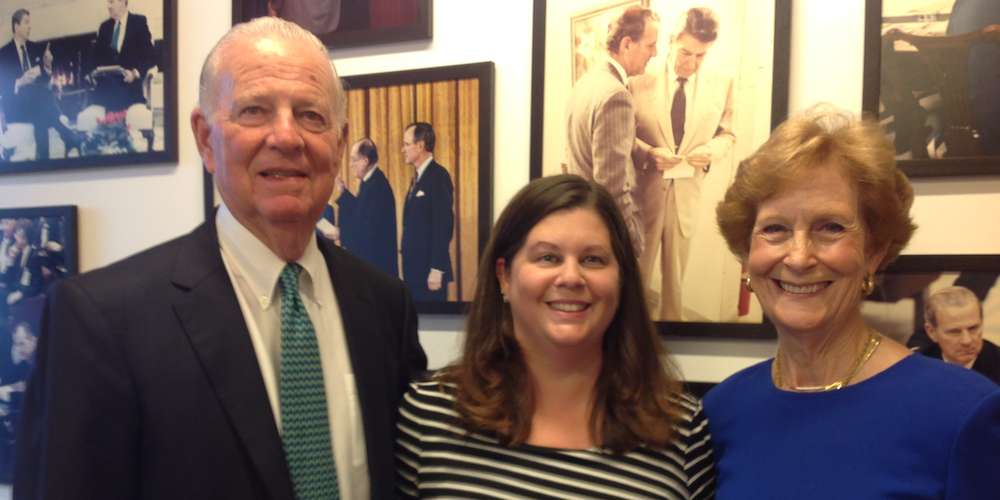How Foreign Service Spouses Carve Out a Professional Path
Although the State Department has made progress in improving job opportunities for family members, many are still unemployed or underemployed.

The congratulations left me puzzled. I had won an award I’d never heard of. I’d been volunteering at a museum in Luxembourg for two years, while my husband was working at the U.S. embassy in the small country, and had no idea that someone from the embassy community had nominated me for the Secretary of State Award for Outstanding Volunteerism Abroad. Now I was being notified that I was the 2009 recipient for service in Europe.
I had already felt lucky when Luxembourg’s National Museum of Military History provided me with an internship opportunity, which was a requirement to complete a remote master’s degree in museum studies from the University of Oklahoma. At the museum, I expanded public outreach, helped create a mobile museum experience for high schools, mentored university interns and revamped the website, among other things.
At the awards ceremony in Washington, which was held in the State Department’s ornately decorated Benjamin Franklin reception room, I was overwhelmed. Hearing about the other winners’ accomplishments left me in awe. Listening to Secretary of State Hillary Clinton talk about my own work and achievements was too much. I questioned whether I deserved this recognition. After all, I was just the spouse of a Foreign Service officer.
I have vacillated between the negative and positive aspects of being “just a spouse” for 20 years. When my husband joined the service, and we moved to Guadalajara, Mexico, for our first tour, I left my job as an environmental consultant. The State Department had a program I hoped would help me continue my career, but it didn’t. I couldn’t find work in my field. In the consulate, the majority of jobs available to spouses were clerical, and I worked as an administrative assistant, but I quickly determined that it wasn’t for me. I wanted to create something that was for me outside of the mission.
So I took the time to reevaluate my professional goals. I always enjoyed going to museums and learning about new cultures, and every major city in the world has museums and cultural centers where I could work or volunteer. I enrolled in the master’s program when we were posted to Venezuela. After Luxembourg, we went to Vietnam, where spouses couldn’t work in the local economy. So I volunteered again, this time at the Vietnamese Women’s Museum. As part of the UNESCO-funded project, I helped revamp the children’s center, prepared lesson plans and engaged with international schools.
Although the State Department has made some progress since the early 2000s in improving job opportunities for spouses and partners, many are still unemployed or underemployed. The constant moves are still barriers to building a career. I’ve met amazing spouses and seen their struggles. As a group, they are well-educated, and many have graduate degrees, including at the Ph.D. level. They are an integral part of diplomatic missions abroad and have a lot to contribute. In addition to employment challenges, they have to deal with family separations, when the Foreign Service officer goes to a high-threat post or the family has to stay behind for educational, health or other reasons. There are also evacuations during crises and natural disasters. That affects morale in the entire mission, and more broadly in the Foreign Service, as it pertains to recruitment and retention.
Laura Sheehan, a friend and fellow spouse, offered practical and valuable advice in a 2018 TedX talk in Hanoi: Be open to and ready for change, embrace the experiences, ditch the titles and make meaningful connections. I’ve learned that one has to be flexible. A Foreign Service spouse’s career doesn’t follow a linear path. There are pauses, gaps, frustrations and unexpected opportunities. For some, a salary is important and necessary. Others find volunteering very rewarding.
Some of my best professional experiences have been unpaid, and one of them even brought me an award. Sponsored by the Associates of the American Foreign Service Worldwide, a private organization, the award for outstanding volunteerism abroad was created in 1990, with the direct support of Secretary of State James A. Baker and his wife Susan.
This year’s recipients included Debra Stock, who arrived in Doha in 2021 at the same time as 58,000 Afghan refugees. She organized volunteers who spent days and nights welcoming the Afghans and providing clothing, hygiene items and children supplies. Through fundraising, they set up and furnished a school for the refugee children. In Moldova, as Ukrainian refugees streamed across the border after Russia invaded its neighbor in February, Meredith Wiedemer volunteered at a donation center that provided emergency supplies like food, hygiene and baby items to more than 38,000 people. In Madagascar, Justin Wimpey devised an affordable pressure-cooker and helped establish a women-led business to market and distribute the pots. That reduced women’s reliance on charcoal for cooking, an added health benefit.
Family members in the Foreign Service contribute significantly to the positive image of the United States around the world. At this point in our history, we can use all the help in that department we can get.
Lara Center is the spouse of a Foreign Service officer, with whom she has been posted to Mexico, Venezuela, Luxembourg, Vietnam and Washington, D.C. She was president of the Associates of the American Foreign Service Worldwide from 2020 to 2022.

